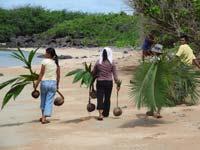25 million Filipinos face coconut crisis

Millions of Philippine coconut farmers face a growing crisis in their livelihoods, an official said, as their trees become too old to produce the fruit that is a mainstay of the country’s exports.
More than 44 million coconut trees - 14 percent of the national total - are past their most fertile age, and without a sufficient replanting programme the industry could be in trouble, warned Euclides Forbes, administrator of the official Philippine Coconut Authority.
He said the government does not have enough money to support the industry, on which 25 percent of the population depends, and private planters are not doing enough, according to reports in Manila.
“If the trees are not replaced, the fall in our coconut production will accelerate. In three to five years, we will not be able to meet export demand,” he said.
He did not say why farmers are not planting new coconuts on their own, but in the past they relied on government incentives to boost production.
Coconut products like dried coconut meat and coconut oil are the Philippines’ largest agricultural exports, earning $1.508 billion dollars for the country last year, official data show.
Coconut Authority figures show production in 2011 is expected to hit only 2.57 million tonnes, down more than 13 percent on 2010 while coconut oil exports will amount to only 1.5 billion tonnes, down 30 percent on the year earlier.
Forbes did not say how much the ageing coconut trees had cost the country but said the decline in production and exports this year could be traced directly to the old trees.
He warned the shortfall could force consumers to switch to alternatives like palm oil.
The Philippines has three million coconut farmers, but 25 million Filipinos - more than one in four people - are dependent on the industry, he said.
Coconut trees are considered mature when they are seven to 25 years old and typically bear 40-65 fruit per year, Forbes said.
He said many of the ageing trees are more than 60 years old and produce only 10 fruit a year and sometimes none at all, making them “senile”.
The government is to spend $6.3 million CAD planting new trees next year, but this represents less than 10 percent of the old trees, Forbes warned.






